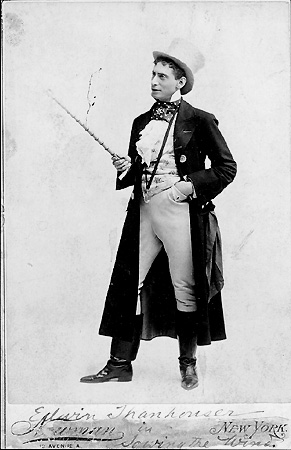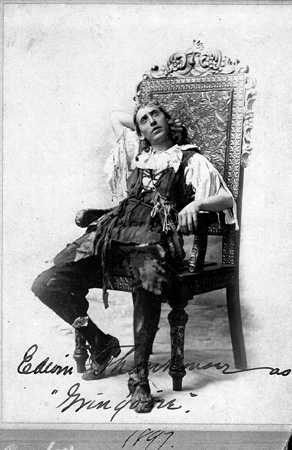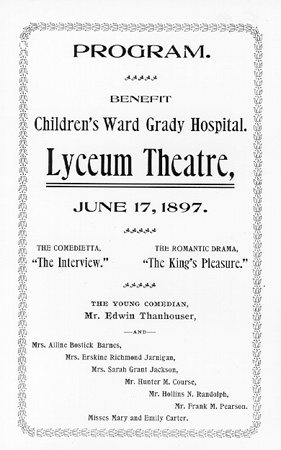 Volume I: Narrative History
Volume I: Narrative History Volume I: Narrative History
Volume I: Narrative History


Edwin Thanhouser (L) in SOWING THE WIND. (Thanhouser family archives, courtesy of Pego Paar) (P-370)
Edwin Thanhouser (R) as Gringoire 1897. (Thanhouser family archives, courtesy of Pego Paar) (P-380)
Around the time the last curtain was ringing down on the Thoroughbred, Edwin Thanhouser joined a road company in the production of Sydney Grundy's four-act play, Sowing the Wind, directed by Julius Cahn. Thanhouser played the role of Sir Richard Cursitor. Among the 11 other cast members was John H. Gilmour, who was listed first on the program, as the character of Mr. Brabazon, a widower. Years later, Gilmour was to work with Thanhouser in films.
An early stop on the tour of Sowing the Wind was Taunton, Massachusetts on March 3, 1897, followed by a day in Fall River on the 4th, a stay in Providence from the 8th through the 13th, a trip to Bloomington, Illinois for an appearance on March 23rd, then to Jersey City for a stint from March 29th to April 3rd. From there it was to Easton, Pennsylvania on April 5th, Trenton on the 8th, and Elizabeth on the 9th. The same play was staged in New York City for a week commencing on Monday evening, April 12, 1897, at Augustus Pitou's Grand Opera House, located on Eighth Avenue between 23rd and 24th streets.
A clipping saved by Edwin Thanhouser from an unidentified newspaper related a reviewer's experience: "The night I saw Sowing the Wind Sir Richard Cursitor [Thanhouser's role] was undoubtedly the hit of the piece, practically all of the light comedy work devolving upon his shoulders...."
The next week, on April 21st, the same play was presented in Scranton, Pennsylvania. In this performance, Gilmour was absent from the cast roster, and the part of Brabazon was taken by Herbert E. Sears. Evidently, the spring 1897 run of Sowing the Wind was brief, especially in comparison to the durable Thoroughbred, and Edwin Thanhouser pasted in his scrapbook just a few clippings concerning it. However, during the next several years it was presented as part of the repertoire of other companies with which he was associated.
Sometime in 1897, while visiting New York City, Edwin Thanhouser was admitted to the Players Club, which was (and still is) situated in the stone residence of Edwin Booth at Gramercy Park South. Booth, who had founded the organization in 1879, gave his home to the club upon his death in 1893. The Players Club was (and is) composed primarily of prominent local businessmen and society figures, with stage players and producers forming the minority, although the theme of the organization centers about theatrical activities. Note
"Dad retained his membership in the Players Club for the remaining 59 years of his life," his son Lloyd recalled. "He greatly enjoyed being there and took me with him a number of times. Near the end, however, Dad stopped going to his favorite club, for he had outlived all his old friends." The emblem of the Players Club depicted the masks of Comedy and Tragedy. Years later in his film enterprise, Edwin Thanhouser adapted these icons as the main feature of the Thanhouser Company's trademark.
Following performances of Sowing the Wind, Thanhouser returned to his home in Atlanta, where he spent the summer of 1897. A local reporter was impressed with his talent, and wrote: "Mr. Thanhouser is making a decided success in his profession and is regarded in the North as one of the coming men. He was with the Thoroughbred company last season and scored a hit in the comedy character. Mr. Thanhouser is particularly noted for his mastery of difficult make-up [as exemplified by] his role of the grave-digger in Hamlet and as a dandified poet in Thoroughbred. He has an important part next season in Frohman's Under the Red Robe."

Cover of the program for performances at the Lyceum Theater, Atlanta, on June 17, 1897. Edwin Thanhouser was featured as a comedian. The next day, The Constitution noted: "Society was out in force at the Lyceum last night to witness the amateur performance of The Interview and The King's Pleasure. It is no exaggeration to say that it was one of the very best amateur performances ever seen in Atlanta...Mr. Thanhouser's light comedy role of 'Martin George' fitted him like a glove, and he had not spoken a dozen words before he won golden opinions from all." (F-10)
Before long he was back on the stage, appearing in Atlanta at the Lyceum Theatre on June 17th in a two-feature benefit performance of The Interview, a comedy in one act, in which he played the part of Martin Grange, a dramatic author; and The King's Pleasure, a one-act romantic drama, in which he took the role of Gringoire, a poet of the people. Note The printed program for the event showcased his name at the center of the cover: "The Young Comedian, Mr. Edwin Thanhouser," with the other cast members listed in smaller type below. Clearly, Edwin Thanhouser had achieved prominence in his chosen profession.
On the next day The Constitution reported that "Mr. Thanhouser's light comedy role of 'Martin George' fitted him like a glove, and he had not spoken a dozen words before he won golden opinions from all. The somewhat more ambitious play, The King's Pleasure, was a brilliant success from every point of view. In this, Mr. Thanhouser essayed a heavier part, that of 'Gringoire, a poet of the people.' His conception of the character was a most original and poetic one, and his acting an exceedingly effective combination of comedy and pathos." Another Atlanta paper suggested that he was "the right person in the right place."
Copyright © 1995 Q. David Bowers. All Rights Reserved.